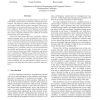59 search results - page 10 / 12 » Modeling Adaptive Behavior with Conceptual Spaces |
CIARP
2006
Springer
13 years 10 months ago
2006
Springer
The Neural Gas (NG) is a Vector Quantization technique where a set of prototypes self organize to represent the topology structure of the data. The learning algorithm of the Neural...
ICCD
2004
IEEE
14 years 5 months ago
2004
IEEE
Simultaneous Multithreading (SMT) is emerging as an effective microarchitecture model to increase the utilization of resources in modern super-scalar processors. However, co-sched...
BMCBI
2006
13 years 8 months ago
2006
Background: Particle Swarm Optimization (PSO) is an established method for parameter optimization. It represents a population-based adaptive optimization technique that is influen...
ISPASS
2007
IEEE
14 years 2 months ago
2007
IEEE
Parameter variation due to manufacturing error will be an unavoidable consequence of technology scaling in future generations. The impact of random variation in physical factors s...
ATAL
2010
Springer
13 years 9 months ago
2010
Springer
Multi-agent learning is a crucial method to control or find solutions for systems, in which more than one entity needs to be adaptive. In today's interconnected world, such s...

